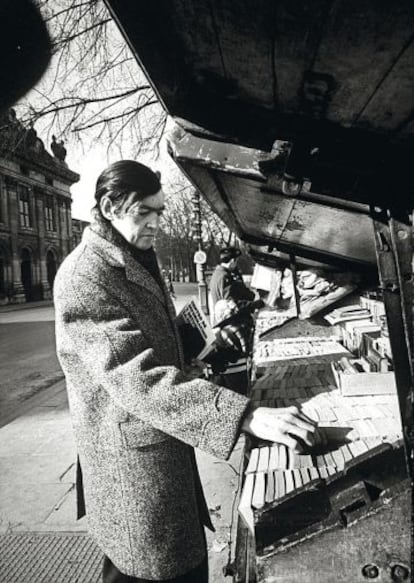The writer Truman Capote, in Venice in 1950.GETTY IMAGES
Borges said: "All writers walk towards anonymity, only the mediocre arrive a little earlier." However, posterity is available to any writer who, regardless of his literary talent, has become a source of anecdotes. Oscar Wilde said: "The difference between a whim and a great passion is that the whim can last a lifetime." In the same way, in the face of a masterpiece by an author, any anecdote in his life is the one that leads him to immortality. Just for a happy phrase many have gone down in history. Despite having written more than a hundred books, some very notable, Francisco Umbral will be remembered because one day with an extra drink he said on television that “I have come to talk about my book”.His glory will come to him when that phrase also becomes anonymous and only the very learned know who first uttered it in the 20th century.
Asked by Senator Joseph McCarthy to testify before the Committee on Un-American Activities, in the middle of the packed hall of Congress, Arthur Miller said: "I do not feel innocent enough to curse others who have failed to be strong."
Before that same stage, the film director John Ford had challenged the members of the committee: “You have half an hour to ask me what you want.
At ten I start filming ”.
The death of a salesman
and
The diligence
are contained in those answers, which are a moral challenge.
For her part, Dorothy Parker summed up the chaos of her life with this outing: "I take the first drink on the table, the second under the table, the third under the producer."
When Samuel Beckett was awarded the Nobel, he exclaimed: "What a catastrophe!"
Truman Capote took this self-portrait: “I'm about the height of a shotgun and I'm just as noisy. I am an alcoholic. I am a drug addict. I am gay. I'm a genius". When in Palamós he was writing
In Cold Blood, he
was welcomed by a diabolical dilemma. During her visits she had fallen in love with one of the inmates, but she needed the murderers to be taken to the gas chamber for her novel to be successful. If Christ, instead of being crucified, had been sentenced to 12 years and a day, his life would have been uninteresting and the Church would not have existed.
Samuel Beckett was awarded the Nobel Prize in 1969. He received the news in Tangier. After thanking, he exclaimed, "What a catastrophe!" And then he was lost in the desert of Africa. One day, Beckett was badly stabbed on a Paris street corner by a homeless man. When he left the hospital, he visited him in jail and asked him: "Why did you do it?" The tramp replied, "I don't know." In that answer the essence of the absurd that invades all the work of this immense writer is synthesized. Here is a dialogue from his
Final game play. “
Client: God is capable of making the world in six days and you are not capable of making pants in six months. Tailor: But, sir, look at the world and look at your pants ”.
When in 1981 Mitterrand granted Julio Cortázar French nationality, on a wall in Buenos Aires this graffiti appeared: "Come back, Julio, what does it cost you?"
Cortázar returned to Buenos Aires to visit his very ill mother and was seen wandering like a stranger through the Ezeiza airport without anyone recognizing him or having come to greet him.
It was never accepted by any established authority.
Today in the Palermo neighborhood of Buenos Aires there is a square with his name, from which the street dedicated to Jorge Luis Borges starts.
Nearby stretches a wall where transvestites sacrificed themselves in the dark.
On that wall was written that prayer for him to return home.
Julio Cortázar, searching for books in Paris.Pierre Boulat (Getty)
Dylan Thomas walked into the usual Swansea tavern in South Wales, the windows clouded by the vapor of alcohol and commented with a colleague leaning next to him at the bar: “The first obligation of a journalist is to be well received. in the morgue ”. And with that said, he lit a cigarette and asked for a pint, thus opening up the wave of beer on which he would always sail until he was shipwrecked.
John Kennedy and Jaqueline were collecting celebrities to grace some private White House dinners.
Norman Mailer, Saul Bellow, Arthur Miller, and the
larger and smaller
Sinatras
had passed his table
.
Even Pau Casals had adorned with his cello some exquisite desserts.
When Faulkner was invited, he replied by return mail: “Mr. President, I am just a farmer and I have no appropriate clothing for that event.
Now, if you have any interest in dining with me, I would gladly invite you to my home in Rowan Oak, in Oxford, Mississippi. "
The history of literature is nothing more than a heap of anecdotes, occupying the blank margins of masterpieces.
They are the ones that lead their authors to posterity.







/cloudfront-eu-central-1.images.arcpublishing.com/prisa/4MR54LWM65BH7GFYCRJ3IKALG4.jpg)





